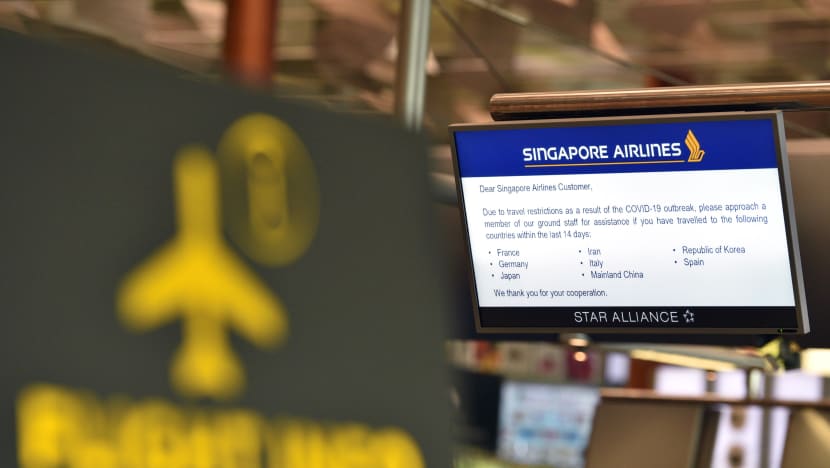Singapore to gradually reopen borders, plans to resume essential travel among countries with low COVID-19 transmission rate

A Singapore Airlines travel advisory at Changi Airport Terminal 3. (Photo: Jeremy Long)
SINGAPORE: Singapore will gradually reopen its borders with safeguards in place to allow Singaporeans to conduct essential activities abroad and for foreigners to enter and transit through the country, the Ministry of Health said on Tuesday (May 19).
"We will do so in a careful manner with the necessary precautions and safeguards," the ministry said.
Singapore will exit the COVID-19 "circuit breaker" on Jun 1, and reopen in phases.
READ: COVID-19: Graduating primary, secondary students to attend school on weekdays after circuit breaker ends; others to rotate weekly
But the reopening of Singapore's borders will be "assessed and implemented separately from the timing of the three broad phases of reopening" as the global situation remains "volatile".
"Singapore is currently exploring the possibility of piloting green lane arrangements with a few countries assessed to be at equivalent or lower risk of community transmission as Singapore, for which essential travel in limited numbers and with safeguards, could be conducted safely," the health ministry said.
It will consider expanding such arrangements gradually as global conditions improve.
READ: COVID-19: Singapore in discussion with other countries on lifting travel restrictions with safeguards in place
PUBLIC TRANSPORT
Locally, as more people return to work and school, public transport will have to implement certain safe management measures.
Businesses will have to stagger their working hours to minimise travel during peak periods.
"Despite these efforts, it will be difficult to maintain physical distancing between commuters, especially during peak periods," said MOH.
Commuters will be required to wear a mask, refrain from talking to one another or on their mobile phones, and maintain good personal hygiene.
Buses and trains are being cleaned more frequently and thoroughly, and transport operators will use anti-microbial chemical coatings on exposed surfaces.
READ: COVID-19: MOM lays out requirements firms must meet to resume operations at workplaces
As the country eases measures and moves into "the next phase", capabilities to control and contain any subsequent outbreaks will be improved.
The ministry will expand its testing capacity with the ability to diagnose cases early and screen all individuals at risk.
MOH said that it will expand its ongoing “sentinel surveillance” for undetected cases in the community.
As of Sunday, more than 290,000 COVID-19 tests, or around 5,100 per 100,000 people in Singapore, have been conducted.
This includes about 22,000-odd residential care facilities residents and staff members, and around 82,000 foreign workers in dormitories. Another 8,500 preschool and early intervention staff have been swabbed.
READ: Construction workers to be tested regularly when projects gradually resume after circuit breaker
Contact tracing will be sped up to identify and isolate close contacts of infected people.
"Upon detection of a case, we aim to be able to identify their close contacts quickly, and notify them of the need to be quarantined. This will help to ring-fence the cases and reduce the likelihood of clusters forming," said MOH.
The ministry will also ensure there is sufficient healthcare capacity to deal with any potential surges in cases that Singapore "must still expect from time to time".
"As more people return to their workplaces or take part in social activities, the risk of community transmission will increase as the virus will have more opportunities to spread between people. We will need all Singaporeans and fellow residents to play our part to keep Singapore COVID-safe," said MOH.
"DEVELOP A GREATER SENSE OF SOCIAL RESPONSIBILITY": MOH
The ministry reminded individuals and families to "develop a greater sense of social responsibility, by raising and maintaining overall cleanliness and hygiene levels through changes in our personal habits and inculcating new social norms".
Wearing masks outside of the home will continue to be mandatory after the circuit breaker ends.
READ: Transition to a 'new normal' after circuit breaker: How will measures be lifted beyond Phase 1?
READ: SAF, SPF and SCDF to resume basic training with COVID-19 preventive measures from May 26
Those who eat together should avoid sharing food and crockery, or to do so only with separate utensils, MOH said.
While eating out at hawker centres, coffee shops and food courts, patrons should clear their trays and used crockery after meals and keep the table clean for other users, it added.
Residents in Singapore should continue to avoid crowded places, pay special attention to vulnerable groups and seniors, minimise time outside the home and try to keep in touch with others through non-physical means as much as possible to avoid unnecessary social gatherings.
BOOKMARK THIS: Our comprehensive coverage of the coronavirus outbreak and its developments
Download our app or subscribe to our Telegram channel for the latest updates on the coronavirus outbreak: https://cna.asia/telegram












